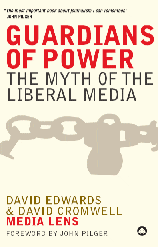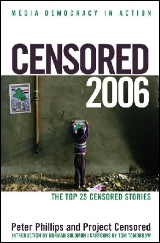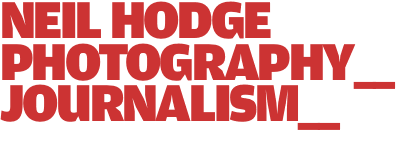Site created by Amplitude. |
||
Guardians of Power review
Guardians of Power: The Myth of the Liberal Media, David Edwards
and David Cromwell – Pluto Press, £14.99
Censored 2006, Peter Phillips (editor) – Seven Stories Press, £12.99
Almost single-handedly Pluto Press has consistently published books that question the quality of mainstream journalism and which seek to hold the so-called “liberal media” to account for inaccurate – and often blatantly flagrant – reporting.
Guardians of Power: The Myth of the Liberal Media, Pluto’s latest offering, is written by David Edwards and David Cromwell, the co-editors of Media Lens, a website that says that it is dedicated to “correcting the distorted vision of the corporate media”.
Like most of Pluto’s publications, the book is highly readable, intelligent and provocative. That it has been left to two non-journalists to dismantle the myth of “media independence”, question the quality of reporting, and criticise established media organisations for their flawed analysis and lame attacks on propaganda speaks volumes about the state of contemporary mainstream journalism and its inability – or reluctance – to address or recognise its faults.
The book examines the reporting of the Iraq war, Afghanistan, East Timor, Haiti, and such topics as climate change and the funding of the press. It also features responses from many of the UK’s most well-known reporters, such as Andrew Marr and John Humphrys, regarding criticisms of their reporting and treatment of “evidence”.
Marr is pulled up for his use of purple prose in a piece he wrote for The Observer in April 1999 about his support for the “humanitarian” NATO bombing in Serbia for attacks on Albanians in Kosovo. As expected, Marr is non-plussed by it all.
But Marr is not the only journalist to be recalcitrant about what actually happened – or did not happen – in Kosovo. Scores of journalists, who by their reputations should have known better, quite gladly reported as if fact incidents they had not seen and could not verify, such as mass killings, rape camps, and mass graves. These events may have happened, but no journalist saw any of it. The frequent use of terms such as “massacre” and “ethnic cleansing” were also unhelpful in presenting an accurate account of events. The killing of 45 Albanian civilians at Racak in January 1999 was a decisive moment in garnering public support for a NATO bombing campaign, but does such an act constitute a “massacre”? The Observer went further, saying that the killings constituted genocide as Serbian troops “pursued their own version of a Balkan Final Solution”.
Humphrys, however, stands out. Two weeks after being criticised by a listener for an interview he did with Foreign Secretary Jack Straw in October 2002 about the withdrawal of UN weapons inspectors from Iraq (Straw said they were “expelled”), Humphrys learned from his mistake and chastised Straw for trying to deceive listeners.
At a time when the quality of mainstream journalism is ever more being called into question, Guardians of Power is an insightful look into how news organisations refuse to admit that they are wrong, defending poor journalism rather than the facts.
Censored 2006 presents what the editor Peter Phillips of Project Censored, a media research group, feels to be the most censored stories of 2004 and 2005. Unsurprisingly, the collection includes unanswered questions surrounding the vote count at the 2004 US Presidential election – essentially how Bush stole the presidency for a second time – as well as the spurious reasons – or rather lies – regarding the decision to invade Iraq.
While the collection has a diverse range of stories, the book suffers for two reasons: its focus is purely US, so the majority of the material may be of little interest to UK readers. Secondly – and more importantly – the stories have not really been censored. Anyone who reads news on alternative journalism or news websites will already be familiar with the content. The title of the book is really a misnomer: it really refers to stories that were under-reported or ignored in the mainstream US press.
“At a time when the quality of mainstream journalism is ever more being called into question, Guardians of Power is an insightful look into how news organisations refuse to admit that they are wrong, defending poor journalism rather than the facts”


